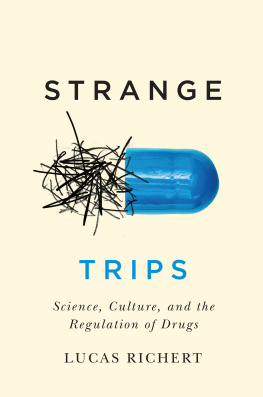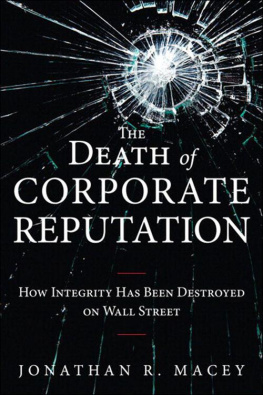
Reputation and Power
PRINCETON STUDIES IN AMERICAN POLITICS: HISTORICAL, INTERNATIONAL, AND COMPARATIVE PERSPECTIVES
Series Editors
Ira Katznelson, Martin Shefter, Theda Skocpol
A list of titles in this series appears at the end of the book
Reputation and Power
ORGANIZATIONAL IMAGE AND PHARMACEUTICAL REGULATION AT THE FDA
DANIEL CARPENTER
PRINCETON UNIVERSITY PRESS
PRINCETON AND OXFORD
Copyright 2010 by Princeton University Press
Published by Princeton University Press, 41 William Street, Princeton, New Jersey 08540
In the United Kingdom: Princeton University Press, 6 Oxford Street, Woodstock, Oxfordshire OX20 1TW
All Rights Reserved
Library of Congress Cataloging-in-Publication Data
Carpenter, Daniel P., 1967
Reputation and power : organizational image and pharmaceutical regulation at the FDA / Daniel Carpenter.
p. cm. (Princeton studies in American politics) Includes bibliographical references and index.
ISBN 978-0-691-14179-4 (hardcover : alk. paper)
ISBN 978-0-691-14180-0 (pbk. : alk. paper)
1. United States. Food and Drug Administration. 2. Pharmaceutical policyUnited States. 3. DrugsResearchUnited States. I. Title.
RA401.A3C37 2010
362.1782dc22
2009044230
British Library Cataloging-in-Publication Data is available
This book has been composed in Postscript Sabon
Printed on acid-free paper.
press.princeton.edu
Printed in the United States of America
10 9 8 7 6 5 4 3 2 1
TO RITA
CONTENTS
INTRODUCTION
The Gatekeeper |
CHAPTER ONE
Reputation and Regulatory Power |
CHAPTER TWO
Reputation and Gatekeeping Authority: The Federal Food, Drug and Cosmetic Act of 1938 and Its Aftermath |
CHAPTER THREE
The Ambiguous Emergence of American Pharmaceutical Regulation, 19441961 |
CHAPTER FOUR
Reputation and Power Crystallized: Thalidomide, Frances Kelsey, and Phased Experiment, 19611966 |
CHAPTER FIVE
Reputation and Power Institutionalized: Scientific Networks, Congressional Hearings, and Judicial Affirmation, 19631986 |
CHAPTER SIX
Reputation and Power Contested: Emboldened Audiences in Cancer and AIDS, 19771992 |
CHAPTER SEVEN
Reputation and the Organizational Politics of New Drug Review |
CHAPTER EIGHT
The Governance of Research and Development: Gatekeeping Power, Conceptual Guidance, and Regulation by Satellite |
CHAPTER NINE
The Other Side of the Gate: Reputation, Power, and Post-Market Regulation |
CHAPTER TEN
The Dtente of Firm and Regulator |
CHAPTER ELEVEN
American Pharmaceutical Regulation in International Context: Audiences, Comparisons, and Dependencies |
CHAPTER TWELVE
Conclusion: A Reputation in Relief |
ILLUSTRATIONS
TABLES
ACKNOWLEDGMENTS
MY DECADES-LONG fascination with regulation was formed from listening to two old men and a young woman. The first of the men was my grandfather, Edward R. Krumbiegel, who served as health commissioner for the city of Milwaukee, Wisconsin, from 1940 to 1973. The young woman was my mother, Kathleen (Krumbiegel) Carpenter, an accomplished and dedicated radiologist in her own right (and still young). As my grandfather reminisced about old battles won and lost, and as my mother told me stories about her fathers tenure in city life, I learned that public health was an endeavor not only of science but of politics in its best and worst aspects. I learned that in his management of Milwaukees healthin contests over fluoridation, pest control, building and residential codes and other mattersEd Krumbiegel wore at least two facesone benevolent, another fierce. The same generous man who could inspire his staff and the citys residents to labor with devotion for the common good could also turn his anger instantly and brashly upon city politicians and businesses who stood in the way of what he considered progress. As his grandson, I saw some of these same faces: his infectious, warm humor and his humbling dinner-table corrections.
The second man was Marver Bernstein, whom I hardly knew, but whose course in business and government I took in my final semester at Georgetown College in the spring of 1989. Bernstein was a university professor at Georgetown who had served as the first Dean of the Woodrow Wilson School at Princeton and had concluded his presidency at Brandeis six years before. A generation before I attended college, he had authored Regulating Business by Independent Commission, still a classic in which many precepts of what is now known as the capture theory of regulation first appeared. Bernsteins vigorous denial of the model of regulators as Platonic philosopher-statesmen in his last lecture for that course still resonates for me. Twenty years later I can still hear, even feel, his voice rising as he pounded the lectern and thundered home the point. Marver Bernstein understood, in ways that elude many scholars today, that regulators are complicated human agents embedded in organizations. They defy the portrait of neutrality and pure public-spiritedness that Bernstein had observed in the early twentieth century, and they defy as well the picture of interest-obedient and inevitably captured bureaucrats that was emerging as he wrote in the 1950s.
My initial debts in this study, then, are to the people who first inspired me to think about regulation and its politics, in ways having nothing to do with the FDA.
What follows these expressions of gratitude is not the book I set out to write. I first envisioned a rather simple story about how a plain reputation for consumer protection had shaped the regulatory behavior of a federal agency, in particular the time it took for the Administration to review new drug applications. As I waded deeper into thousands of documents from dozens of archival collections across several continents, as I interviewed and read oral histories of participants in and observers of American pharmaceutical regulation, and as I consulted a range of colleagues, I learned that the Food and Drug Administration meant different things to different beholders. It also became clear to me that no simple covering law ruled the political economy of U.S. pharmaceutical regulation, that many simplistic generalizations well equipped for the 1960s failed utterly in describing the 1980s or the 1940s, and vice versa. Marver Bernstein had understood this historicity in the 1950s, describing the various life cycles of agencies. It became my task to portray the historical complexity of an organization, its images and its governance of a vast world, while bringing some intellectual order to its reputation and its power.
Because of the complexity of the subject matter and the historicity of regulation, and because I believe that organization theory provides a crucial lens for understanding American pharmaceutical policy, what follows these measures of thanks is also an academic treatment, and unapologetically so. The research was supported in numerous ways, by archivists, collaborators, and research assistants, and perhaps most, by critics and colleagues.
For research support, I gratefully acknowledge the Center for Advanced Study in the Behavioral Sciences, an Investigator Award in Health Policy Research from the Robert Wood Johnson Foundation, the Co-Evolution of States and Markets Program of the Santa Fe Institute, the National Science Foundation (SES-0076452 and SES-0351048), and the Faculty of Arts and Sciences at Harvard University. Fellowships from the John Simon Guggenheim Memorial Foundation and the Radcliffe Institute for Advanced Study allowed me to spend a sabbatical year completing the manuscript while launching a new project on petitioning in American political development. I also benefited from support from the Deans of the Harvard Faculty of Arts and Sciences, including the late Jeremy Knowles, Mike Smith, David Cutler, and Stephen Kosslyn. My chair, Nancy Rosenblum, who understands the value of large, in-depth scholarly projects, was ever encouraging and a beacon of sanity.
Next page













